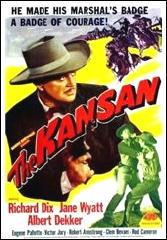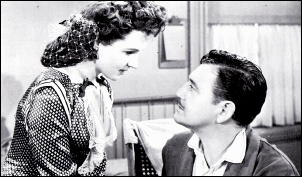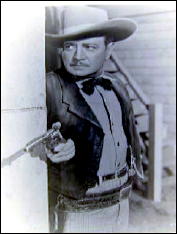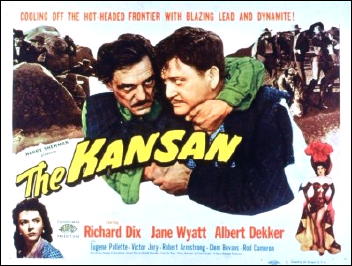Fri 26 Nov 2010
A Western Movie Review by Daryl S. Herrick: THE KANSAN (1943).
Posted by Steve under Reviews , Western movies1 Comment
THE KANSAN. United Artists, 1943. Richard Dix, Jane Wyatt, Albert Dekker, Victor Jory, Eugene Pallette, Robert Armstrong. Screenplay: Harold Shumate, based on the novel Peace Marshal by Frank Gruber. Director: George Archainbaud.

If this review of the 1943 western film The Kansan starring Richard Dix had been published in a newspaper at the time, a sly headline writer may have tried to put this one across: Nix on Dix, He’s No Tom Mix.
The role of the film’s hero, gunplay artist John Bonniwell, fits Dix like a poorly cut, over-sized suit that makes him look ridiculous. He is not as young and fit as a Buster Crabbe or Bob Steele, both of which would have been a better suited for the role, and unlike the older John Wayne in The Shootist, when the husks are peeled away, it is difficult to believe that Dix was ever such a skilled triggerman. Dix fills the role as well as a bloated John Barrymore might have.
What Dix does bring to the role is a modicum of acting ability, and he is successful in his nuanced play with the quasi-villain played by Victor Jory and is charming with the female lead, Jane Wyatt. Jory has the more demanding part and delivers a stronger performance as Jeff Barat, the brother of the irredeemable, crooked banker Steve Barat who masterminds the movie’s machinations.

Dix ambles through the movie while the exciting parts like a stampede and all-compassing saloon fight happen around him. Dix is so lugubrious that he brings to mind an insurance salesman apt at dolefully describing death and disaster.
Not as lively as a game of checkers, nor as well thought out as a game of chess, the story moves from one square to the next across a familiar board. Drawn from the novel Peace Marshal by Frank Gruber, Dix’s character John Bonniwell demonstrates his finesse with the pistol and is maneuvered into the marshal’s job by the moneyed Easterner who runs the bank, played by Albert Dekker.
Jory’s character is the gambler brother of the banker and is in love with the woman that Bonniwell loves. The villainous banker brings in his own set of outlaws to balance out the law. Following the same plot that dozens of other bottom-billed Westerns used, the hero cleans up the town and gets his gal.

One character, Bones, played by African-American Willie Best, stands out for the wrong reasons. Granted one should be careful about judging attitudes held more than a half century before, but the Bones character with his craven servitude and witless blubbering is a throwback even further to the nastiest caricatures of blacks.
In one scene, the outlaws sarcastically refer to Jory’s character as the Great Liberator and moments later, find the crouching, shivering Bones in his Union soldiers cap; it is as if the movie is almost saying, this is why we have Jim Crow laws.
In a brief key part is the hefty character actor Eugene Pallette, whose voice croaks like a frog and whose bulk and charisma fill the screen in equal proportions. Rushing masses of cattle and horses at various junctures provoke those passions stirred by thundering hooves. A troupe of pretty girls seems to have taken a wrong turn at Times Square as they present their musical number on a saloon stage instead of Broadway.
In that granddaddy of Western talkies, Cimarron (1931), a younger, lithe Richard Dix ably acted the part of Yancey Cravat, but with its playbill opening and grease-painted actors, this earlier film is a thespian production without the constraints of the stage. The recipe for a low-budget Western does not call for a stage actor but a macho movie presence. Dix could muster the former but not the latter.

November 30th, 2010 at 7:29 am
Very apt evocation of Dix and a tired, tired film.